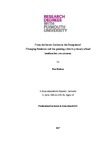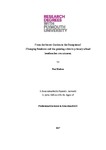From the Secret Garden to the Panopticon? Changing freedoms and the growing crisis in primary school headteacher recruitment.
| dc.contributor.supervisor | Kelly, Peter | |
| dc.contributor.author | Hodson, Paul | |
| dc.contributor.other | Plymouth Institute of Education | en_US |
| dc.date.accessioned | 2018-01-23T12:02:31Z | |
| dc.date.issued | 2018 | |
| dc.identifier | 10168393 | en_US |
| dc.identifier.uri | http://hdl.handle.net/10026.1/10649 | |
| dc.description | Edited version embargoed until 23.01.2019 Full version: Access restricted permanently due to 3rd party copyright restrictions. Restriction set on 23.01.2018 by SE, Doctoral College | |
| dc.description.abstract |
A headteacher recruitment crisis continues in the primary education sector (Howson & Sprigate, 2011; Rhodes et al., 2008). This research offers a voice for an increasingly marginalised group and synthesises the experiences of 15 primary headteachers, including retired, experienced and new school leaders against the changing educational scenery of four decades. An extended metaphor describing a changing epistemological landscape is utilised (Pascale, 2011), including dramaturgical discourse (Goffman, 1974). The research assesses whether the lived experiences of school leaders evidence a supposed movement away from the ‘freedom’ of the ‘secret garden’ of the pre-National Curriculum era to a time of reducing freedoms for headteachers under a central panoptic gaze (Foucault 1979; Ball 2006) and then to a new ‘supported autonomy’ as suggested by ‘Education Excellence Everywhere’ (DfE, 2016). The thesis assesses the capacity of phenomenological methodology to address the research questions and distinctions are made between approaches to phenomenology. A case is made for ensuring critical rationalism within the methodology and difficulties of attaining ‘epoche’ and ‘phenomenological reduction’ are debated. Findings support the view that there have been significant changes to headship over time. Analysis of these changes does not support the concept of a linear movement from a time of freedom to a landscape defined by Panopticism. The research suggests that a new paradigmatic shift is significantly changing the nature of primary headship with new forms of executive leadership and structures for leadership progression. Recommendations call for a reduction in the frequency of change for school leaders, a simplification of the inspection grading system, provision of clearer pathways to headship and greater support for school leaders as local authority services decline and safeguarding for leaders from the growth of social media abuse. This research offers a unique insight into headship and addresses an identified gap in educational research. | en_US |
| dc.language.iso | en | |
| dc.publisher | University of Plymouth | |
| dc.subject | Headteacher recruitment | en_US |
| dc.subject | Secret garden | |
| dc.subject | Changing freedoms | |
| dc.subject | Panopticism | |
| dc.subject.classification | Other (e.g., MD, EdD, DBA, DClinPsy) | en_US |
| dc.title | From the Secret Garden to the Panopticon? Changing freedoms and the growing crisis in primary school headteacher recruitment. | en_US |
| dc.type | Thesis | |
| plymouth.version | non-publishable | en_US |
| dc.identifier.doi | http://dx.doi.org/10.24382/624 | |
| dc.identifier.doi | http://dx.doi.org/10.24382/624 | |
| dc.type.qualification | Doctorate | en_US |
| rioxxterms.version | NA |
Files in this item
This item appears in the following Collection(s)
-
01 Research Theses Main Collection
Research Theses Main



